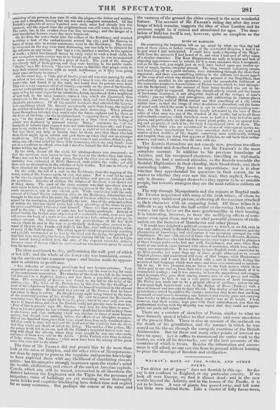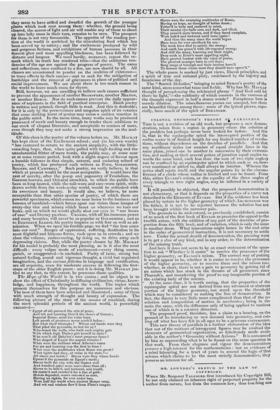MACKAY'S ROPE OF THE WORLD, AND OTHER POEMS.
" THE divine art of poesy" does not flourish in this age. Its de- cay is not confined to England, or any particular country. If we look all over Europe, we find it almost dead ; and in the new worlds beyond the Atlantic and in the bosom of the Pacific, it is yet to be born. A race of giants has passed away, and left none but little men behind them. Like a cluster of lofty forest-trees,
they seem to have stifled and dwarfed the growth of the younger plants which took root among them: whether, the ground being cleared, the access of light and air will enable any of these to shoot up into lofty trees in their turn, remains to be seen. The prospect for them is not very favourable. The appetite of the reading por- tion of the world is surfeited by the stimulating food which has been served up to satiety ; and the excitement produced by wild and gorgeous fictions, and exhibitions of human passions in their fiercest glow and most appalling blackness, has been followed by distaste and languor. We need hardly, moreover, repeat the re- mark which its truth has rendered trite—that the utilitarian ten- dencies of the age are against the progress of' poetry. The cares and reflections, once confined to a few, are now shared by all. All classes are accustomed to ponder on the realities of existence— to trace effects to their causes—and to seek for the mitigation of hardships and the removal of grievances in plans of political and social improvement. We are afraid there is too much reason in the world to leave much room for rhyme.
Still, however, we are unwilling to believe such causes sufficient to prevent the appearance of another SHAKSPERE, another Muraort, or another BYRON. Nor do such causes prevent the daily appear- ance of aspirants in the field of poetical enterprise. Much poetry is written and printed, though little is read. And this is desirable; for it is only by the perseverance and sanguine spirit of its votaries that some striking burst of genius may cause a sudden reaction in
the public mind. In the menu time, many works may be produced possessed of merit and beauty enough to render them additions to our stock of elegant literature, and acceptable to readers of taste, even though they may not make a strong impression on the mul- titude.
Of this class is the poetry of the volume before us. Mr. MACKAY has kept clear of the Excitement school; and (in his own words)
"has ventured to return to the ancient simplicity, with the little- consoling hope, that, when quite palled with high feeding and the unsubstantial fritter of mere words, the public may, at some near or at sonic remote period, look with a slight degree of favour upon
a humble follower in that simple, natural, and enduring school of poetry, which has produced such writers as POPE, GOLDSMITH, ROGERS, and CAMPBELL." Such poetry, we verily believe, is that
which at present would be the most acceptable. It would have the zest of novelty, after the pomp and pageantry of Feudalism, the German horrors, and Oriental atrocities, to which the public have been so long inured, while the toil-worn and care-worn spirit, with- drawn awhile from the work-a-day world, would be refreshed with its sweetness and beauty. It would also, we believe, be more acceptable than that other species of poetry, of which there are powerful specimens, which conies too near home to the business and bosoms of mankind—which forces upon our vision those images of every-day vice and misery which beset us wherever we turn our looks, and on which we would gladly shut our eyes in " our hours
of ease" and literary pastime. CRABBE, with all his immense power and many beauties, will neva be so popular as GOLDSMITH ; and as to EBENEZER ELLIOT, his poetry inspires us with fear as well as ad-
miration. When we open his terrible page, we feel "the iron enter into our soul." Images of oppression, suffering, destitution in its most frightful and hideous forms, rush upon us in crowds ; and we close the volume, endeavouring, by doing so, to drive away such depressing visions. But, while the poetry chosen by Mr. MacKay for his model is probably the most pleasing, so is it also the most difficult : every vulgar mode of excitement—every thing coarse, garish, or exaggerated—is excluded. Purity of taste, strong but natural feeling, sound and vigorous thought, a vivid but regulated
imagination, and the curiosa felicitas in language and versification, are all requisite, even for moderate success in following the foot- steps of the older English poets : and it is doing Mr. MACKAY jus- tice to say that, to this extent, he possesses those qualities.
The Hope of the World is in two cantos : and its object is to show the effect of Christianity in diffusing civilization, virtue, know- ledge, and happiness, throughout the world. The topics which
present themselves for this purpose are numerous and obvious. The best of them have been selected and illustrated ; some of them with much strength of thought and beauty of expression. The following picture of the state of the MUSK'S of mankind, during the most splendid periods of the ancient world, is powerfully executed—
Egypt of old pursued the arts of peace, And wit and learning bless'd the shores of Greece; Imperial Rome, amid her ruins hoar, Lett proofs of greatness never reacted before : But what their triumphs ? Whose sad hands were they That piled the pyramids, to last for ay ? 'Who raised the walls, who built each mighty gate With which high Thebes girt herself' in state? Who rcar'd old Babylon's most gorgeous dunes ? Who shaped of Luxor the august remains ? What were the millions when Athena's name For art and learning was the first to fame ?
What were the multitudes when R01110 was great ?
What rights had they, or value in the state ?— All slaves and helots! Slaves were they whose hands Uprear'd the pyramids on Egypt's sands ; Slaves built the city with the brazen wall And hundred gates more marvellous than all ; Slaves to be lash'd, and tortured, and resold, Or maim'd and murder'd for a fine of gold : Helots degraded, scarce estcem'd as man, Having no rights, for ever under ban, Were half the world when ancient Homer sung, And wit and wisdom ilow'd from Plato's tongue. Slaves were the swarming multitudes of Rome, Having no hope, no thought of better doom ; Fetter d in body and enslaved in mind, Their mental eye-balls sear, and dark, and blind, They crawl'd mere brutes, and if they dared complain, Were lash'd and tortured until tame again! And thus the many since the world begun Have been for ever sacrificed for one : The weak have died to satisfy the strong : And earth has groan'd with oft-repeated wrong; And still the many, knowing not their might, Deep sunk in Error's most appalling night, Have greeted loudest with the voice of praise, The greatest scourges born in evil days; Sang songs of triumph and their incense burn'd To honour those whom most they should have slanged."
The whole poem is marked by just views, liberal principles, and a spirit of true and rational piety, undebased by the bigotry and fanaticism of the day. The "Sacred Melodies," bringing to mind Ilynox's poetry of the same kind, seem somewhat tame and feeble. Why has Mr. MACKAY thought of paraphrasing the celebrated phrase " And God said let there be light,"—the sublimity of which consists in the vastness of the thought expressed in half a dozen words ? Paraphrase here is merely dilution. The miscellaneous poems are unequal, but there are beautiful things among them: some of the lyrical pieces, espe- cially, have much of the spirit of BERANGER.



























 Previous page
Previous page